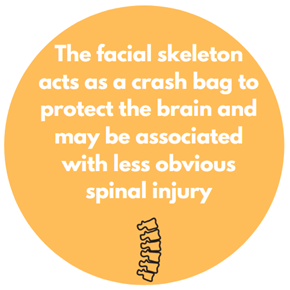The facial skeleton acts as a crash bag to protect the brain and may be associated with less obvious spinal injury. Bleeding is usually self-limiting, except posterior nasal bleeding. ATLS priorities apply, and prevention of avoidable blindness is a specific concern. All other aspects can be immediately transferred to OMFS.
Craniofacial trauma

General considerations
Craniofacial trauma is common and airway is at risk
- ATLS principles apply
- Comminuted fractures to the anterior mandible will reduce the ability of a conscious patient to maintain an airway if supine.
- Bleeding obstructing the airway is usually nasopharyngeal or midfacial and may be associated with a base of skull or comminuted midface fracture. In a conscious patient nasal packs are required, commonly the patient is unconscious and manual occlusion can be achieved by compressing the soft palate and nose.
- If the maxilla is unstable packing will be less effective there for it must be stabilised, manually, with bite blocks or by temporary plate fixation (by OMFS). The patient will require a GA and prompt OMFS input.
- Tranexamic Acid 1g bolus is helpful.

Severe haemorrhage (uncommon)
Compression packs. Adjuncts, urinary catheters via the nose can be used to retain nasal packs with balloon compression posteriorly. There are various products – e.g., rapid rhino. Note these require a stable maxilla.
Prevention of avoidable blindness
- Retrobulbar Haemorrhage in a conscious patient is excruciating and obvious, and it requires immediate lateral canthotomy. In an unconscious patient this must be considered in craniofacial trauma, and it is evident by a tense proptosed eye, compared with the other side.
- Lateral canthotomy is a simple intervention and you are unlikely to cause harm if you follow these principles. Key signs are pain, proptosis, loss of visual acuity and ophthalmoplegia.
- ED immediate lateral canthotomy (request assistance of OMFS or Ophthalmology if time permits) Infiltrate 2mls of local anaesthetic, skip if the patient is unconscious.
- Incise the lateral canthus skin from canthus 45 degrees infero-laterally boldly for 1cm to bone, compress the bleeding edges with a gauze square.

Compress the globe medially, staying on the orbital wall dissect with surgical scissors to cut all the structures that attach the globe to the lateral orbital wall, they are just above the height of the skin canthus and within 1cm of the orbital rim (there is no significant nerves or vessels on the wall).
- You can confirm completion by feeling the globe move medially without tethering to the lateral wall.
- Bipolar diathermy any bleeding at the skin edge.
- If cornea unprotected due to skin loss, cover with eye shields then eye pads.